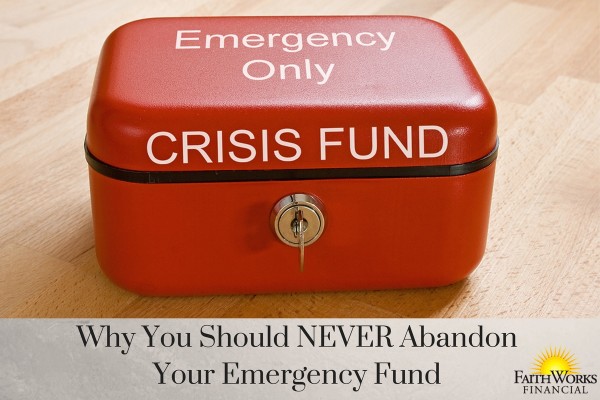Why You Should Never Abandon Your Emergency Fund

The mere thought of an emergency fund used to drive me nuts.
You’re telling me I have to rack up a lump sum of hard-earned cash just to let it sit there, untouched?
You want me to hide away money that could be paying off debt, buying me a car that doesn’t have more dings than miles, or earning some investment income, and let it hang out in a low-interest, low-excitement savings account? Bah.
Fortunately, reason overcame ignorance and impatience, and I (grudgingly) set aside $1,000 in a savings account in case of a rainy day.
It was the bare minimum, I know, but I had debt to pay and it was better than nothing.
And then it rained.
I’ve lost track of how many rainstorms my husband and I have weathered during the four years since we first set aside that emergency money. Off the top of my head I can recall three major car repairs, two moves to new homes, one spur-of-the-moment flight for a death in the family and four trips to the E.R. (This may be above average. We’re a bit accident-prone.)
Our emergencies may not look like yours. Every family is different. However, we all have one thing in common: the next emergency is right around the corner. I don’t say that to distress or discourage you. I say that because it’s reality.
Jesus said, “In this world you will have trouble” (John 16:33).
He didn’t say you “might” have trouble. He said you “will.”

That boring emergency fund just might keep you from drowning.
Of course, He goes on to say that He has overcome the world. Indeed, He has, and anyone who believes in Him will overcome death. Now there’s something to celebrate! But as long as we’re in this world, there are going to be difficulties.
This post is for anyone who, like me, gets aggravated about the necessity of an emergency fund.
Believe me, I understand. In a recent moment of weakness, I came very close to temporarily emptying out our little fund in order to have some extra fun money for our long-anticipated vacation. Thankfully, I kept the emergency money in tact. And guess what happened towards the end of that vacation? My husband tore and dislocated his shoulder, and now we’re looking at some serious medical bills.
It’s not fun, but we’re going to be OK because we have the cash to pay for what we need.
Once again, my love/hate relationship with the emergency fund is leaning towards love.
Stashing away cash for a rainy day is not easy. It also isn’t lucrative, and it’s certainly not exciting. But it is smart.
[Tweet “Stashing away cash for a rainy day isn’t easy, lucrative or exciting. It’s smart.”]
If you’ve procrastinated on building an emergency fund or emptied it out for the wrong reasons, learn from the mistakes, near misses and E.R. visits of others.
Whether you need to trim your everyday expenses or slow the roll on your debt snowball, do whatever it takes to set aside at least $1,000 for a rainy day. If you’re free of consumer debt, beef up that fund until it could carry you through three to six months of unemployment.
Then, rest easy. The next rainy day is just around the corner, and your umbrella is ready to go.
